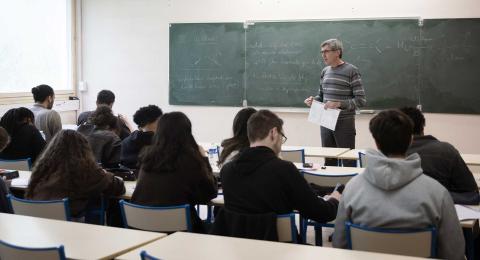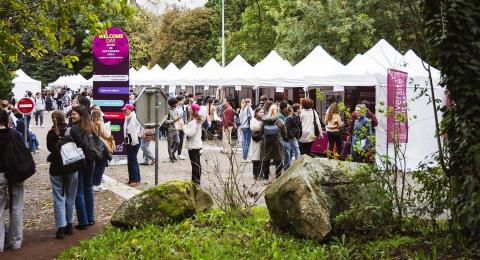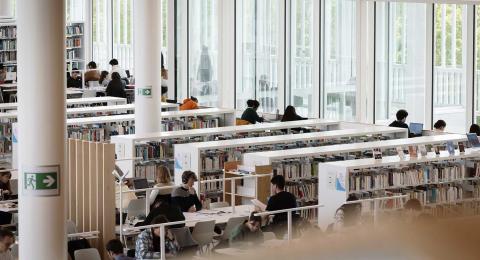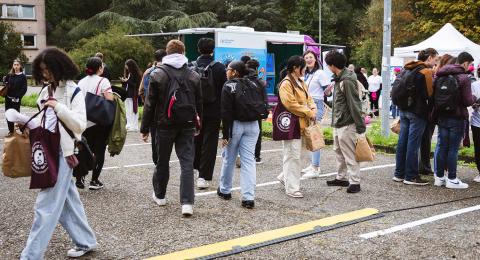Nuclear Energy
The Master’s in Nuclear Energy is an international program that equips talented students from around the world with cutting-edge expertise to drive innovation in the nuclear industry and contribute to the global transition towards low-carbon energy. As a reliable, large-scale and low-emission source of electricity, nuclear power plays a key role in the fight against climate change by helping reduce greenhouse gas emissions. This programm trains tomorrow's experts to tackle global challenges.
The first year of the Master's program (M1) is structured with a common core and two specialization tracks: Physics & Engineering and Chemistry & Chemical Engineering.
These two M1 tracks (coordinated by the Faculty of Science at Orsay) provide the essential knowledge required to pursue one of the five specialization tracks offered in the single second year (M2) of the program:
-
Nuclear Fuel Cycle (NFC, coordinated by Chimie ParisTech)
-
Nuclear Decommissioning &Waste Management (NDWM, co-coordinated by CentraleSupélec and École des Ponts ParisTech)
-
Nuclear Plant Design (NPD, coordinated by ENSTA Paris)
-
Nuclear Plant Operation (NPO, coordinated by CentraleSupélec)
-
Nuclear Reactor Physics and Engineering (NRPE, coordinated by INSTN)
Like the M1, the M2 includes a common core shared by all five specialization tracks.
Information
Analyze, design, and propose solutions to complex problems in one of the major fields of nuclear energy: Engineering, Operations, Waste Management and Decommissioning, Fuel Cycle.
Demonstrate innovation in the nuclear power sector.
Act as a nuclear industry professional.
Lead a project or a team in a multicultural and international environment.
Learning outcome targets
The two M1 tracks—Physics and Engineering and Chemistry & Chemical Engineering—aim to provide comprehensive training that spans essential scientific and technological aspects, as well as the physical and chemical foundations of the nuclear energy field.
Both tracks share a common core curriculum and include fundamental courses that underpin careers in nuclear energy, such as nuclear physics, thermodynamics, neutron transport, radiation-matter interactions, and computer science. In addition, each track includes specialized coursework:
- The Chemistry & Chemical Engineering track offers courses in separative chemistry, speciation and processes, atomic and molecular spectroscopy, nuclear analytical methods, radiolysis, nuclear materials chemistry, and process engineering.
- The Physics & Engineering track includes courses in thermodynamics, continuum mechanics, fluid mechanics, and heat transfer.
These M1 tracks provide the foundational knowledge required to pursue one of the five specialized tracks offered in the second year (M2) of the program:
• **Nuclear Fuel Cycle** (NFC):
This track focuses on the physico-chemical knowledge necessary for the various stages of the nuclear fuel cycle. It introduces the fundamental research concepts needed for the development and optimization of processes, as well as the design of new industrial components.
• **Nuclear Decommissioning & Waste Management** (NDWM):
This track aims to equip students with the knowledge, technical skills, and professional competencies required to manage decontamination and dismantling projects of legacy nuclear facilities (reactors, plants, workshops, laboratories, installations, contaminated sites or soils) and radioactive waste management.
• **Nuclear Plant Design** (NPD):
This track provides in-depth training in the design and construction of nuclear facilities such as nuclear power plants or fuel processing plants.
• **Nuclear Plant Operation** (NPO):
The goal of this track is to teach students how to operate, monitor, and maintain a nuclear facility—especially a nuclear power plant. The program provides a solid knowledge base for understanding the physical phenomena related to facility operation, with a strong emphasis on safety and security.
• **Nuclear Reactor Physics and Engineering** (NRPE):
This advanced track, focused on nuclear reactor physics, is designed to meet the needs of the nuclear industry, including the optimized operation of the current reactor fleet, deployment of Generation III+ reactors (e.g., EPR), and the design of Generation IV nuclear reactors. It also covers experimental reactor design and operation, and the development and interpretation of nuclear experiments.
This track is accessible only through the Physics & Engineering path in M1.
Target audience
Bachelor's degree in Physics, Chemistry or Mechanics; M1 Physics, Chemistry or Mechanics for direct entry into M2









